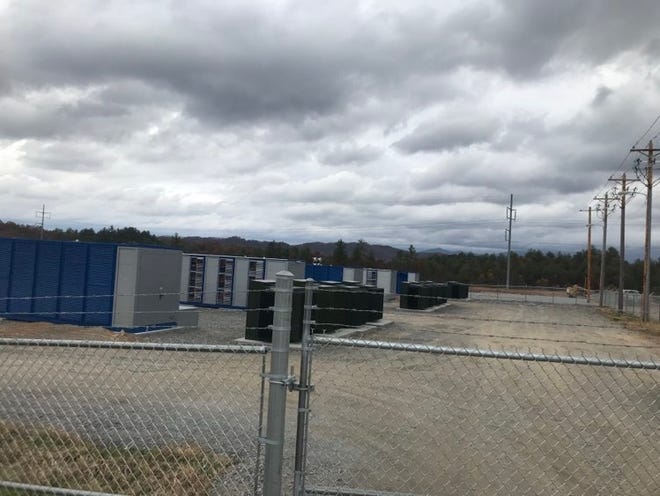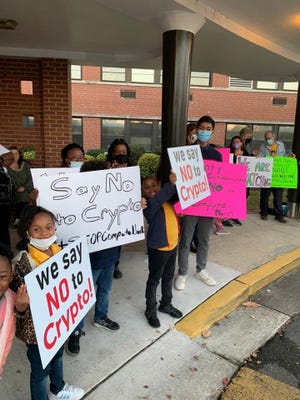ASHEVILLE – County Commissioners approved a one-year moratorium on cryptocurrency mines May 2, a temporary pause fueled by burgeoning concerns as nearby towns battle similar operations and potential negative impacts, such as “excessive energy use, e-waste, pollution and noise.”
Planning Director Nate Pennington briefed commissioners on the proposed ordinance, and said the next year will give the county time to work with residents and Planning Board members to “craft standards for the newly-defined use,” and consider mitigation methods to regulate it.
Large cryptocurrency mining operations, which are basically large warehouses full of computers, are currently not specified as a land use within the county’s zoning ordinances. As of April, the county had no applications for such projects.
“We don’t often bring a moratorium to the table,” Pennington said. As an “emerging technology,” he said the mines are being seen nationwide “that other communities are dealing with.”
The six present commissioners voted unanimously to institute the mortarium, which is effective immediately through May 1, 2024, but speakers at public comment were more divided.
Previous coverage:Buncombe commissioners consider temporary block on cryptocurrency mining; When’s the vote?
More:Buncombe County Commissioners discuss affordable housing, cryptocurrency, finances
‘I urge you to keep an open mind’
Seven people spoke at the May 2 public hearing, with four in opposition to the moratorium. Three others spoke in favor, two of them representatives from area environmental groups.
Chris Joyell, healthy communities director with MountainTrue, thanked the county for being “proactive” on the issue.
“MountainTrue has seen several cryptocurrency mines operating in WNC, especially in Cherokee County, where they have proven to be a nuisance to neighbors and a threat to our environment,” Joyell said.

In North Carolina, the conversation around crypto mining began broadly in the town of Murphy in Cherokee County, about 90 miles southwest of Asheville, wedged between Tennessee and Georgia in the state’s westernmost corner.
In Murphy, noise created from some of the crypto mines has begun to terrorize community members, described in some reporting as an “otherworldly pitch,” and in an August story from The Washington Post, as “a jet-like roar” that never ends.

More:Buncombe Comprehensive Plan heads to final vote; Will guide county growth, development
More:Asheville, Buncombe see record high Q1 median home sales prices; When will prices drop?
Joyell noted electricity use and e-waste, as well as noise pollution. “There is no way to greenwash crypto mining.”
“Let me repeat: As the value of Bitcoin rebounds, the growth of cryptocurrency mining operations put North Carolina in danger of not being able to hit the goals set out by Gov. Cooper and the N.C. General Assembly with House Bill 951,” he said, referencing an energy solutions bill signed in 2021.
But Craig Deutsch, who said he’s lived in Buncombe County for nearly a decade, called instead for commissioners to consider alternative options to the moratorium, and to “approach the topic with curiosity.”
“I urge the county commissioners and planners to take the time to visit Bitcoin mines, do research about Bitcoin’s benefits to the environment … and listen to stories about the positive impacts of Bitcoin for underserved and underbanked communities,” Deutsch said.
“At the end of the day, all Bitcoin mining computers do is run code, and code is a form of constitutionally protected speech.”
More:Tuesday Morning closing, going out of business sale offered in Asheville, Hendersonville
Kimberly Stonebraker, who identified herself as a North Carolina resident since 1999, said she believed Bitcoin would help “restore the American Dream,” and mentioned tactics such as noise mitigation and water recycling at facilities.
“I urge you to keep an open mind,” she told commissioners.
Ken Brame, a Leicester resident and representative from the Sierra Club, said he feared any crypto mining coming to county would impact rural residents, like himself, the most.
“We live out there for a reason,” Brame said. He said he’d heard some residents in Cherokee were selling their homes to escape the noise and other impacts. “We need to take the time to figure out what regulations, what management we have in place to prevent that from happening in neighborhoods like mine.”
Sarah Honosky is the city government reporter for the Asheville Citizen Times, part of the USA TODAY Network. News Tips? Email shonosky@citizentimes.com or message on Twitter at @slhonosky. Please support local, daily journalism with a subscription to the Citizen Times.
Credit: Source link















































